Cover Story: The Driving Question: Do the Symptoms of MS Interfere with Your Driving?
By Shelley Peterman Schwarz
Edited and portions written by Susan Wells Courtney
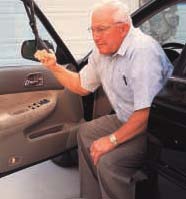
photo copyright and courtesy of Dynamic Living
The CarCaddie™ by Dynamic Living® offers stability and ease when getting in and out of your vehicle.

photo copyright and courtesy of Driving Comfort
The Blind-Spot Mirror by Driving Comfort provides a panoramic view that is up to two-and-a-half times wider than the standard side mirror.
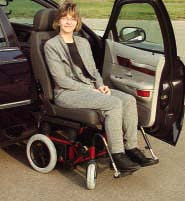
photo copyright and courtesy of Bruno Independent Living Aids, Inc.
The Bruno Carony Automotive Seating System offers a no-lift solution that integrates a seat and convertible wheelchair combination.
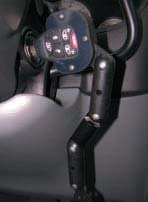
photo copyright and courtesy of Mobility Products & Design
The Remote Key Pocket Extension by Mobility Products & Design fits a remote key and gives better leverage when starting your vehicle.
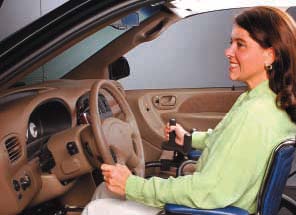
photo copyright and courtesy of Mobility Products & Design
The Tri Pin Grip by Mobility Products & Design uses Push/Pull Control movement to engage the accelerator and brake.
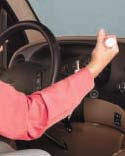
photo copyright and courtesy of Mobility Products & Design
Extension Controls by Mobility Products & Design give extra leverage when operating your gear selector (as shown) and turn signals.
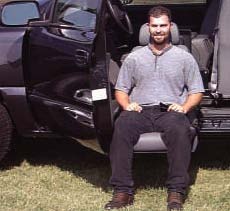
photo copyright and courtesy of Bruno Independent Living Aids, Inc.
Bruno™ offers a complete line of Turning Automotive Seating™ products that allow you to effortlessly enter and exit your vehicle.

photo copyright and courtesy of Dynamic Living
The Handybar™ by Dynamic Living® provides extra support for getting in and out of your vehicle.
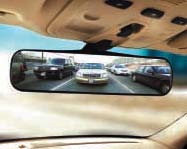
photo copyright and courtesy of Driving Comfort
The Panoramic Rear View Mirror widens your field of vision to make changing lanes and merging easier and safer.
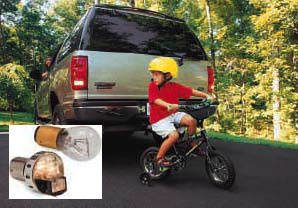
photos copyright and courtesy of Driving Comfort
The easy-to-install Backup Alert lets others know you are backing up.
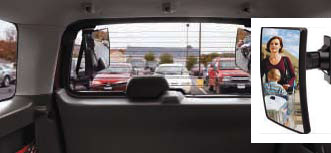
photos copyright and courtesy of Driving Comfort
The ScopeOut® SUV Backup Mirrors increase the field of view when backing up or changing lanes. All three products on this page are from Driving Comfort, a division of International Auto Parts.
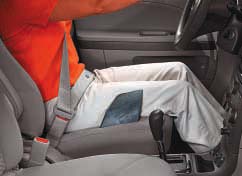
photo copyright and courtesy of Driving Comfort
Drivease by Driving Comfort is a molded rubber insert that minimizes leg pain while supporting the sciatic nerve and lower back.
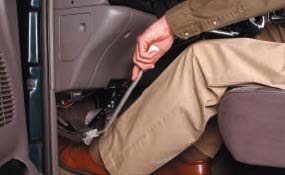
photo copyright and courtesy of Mobility Products & Design
The Parking Brake Extender by Mobility Products & Design makes setting your parking brake an easy task.
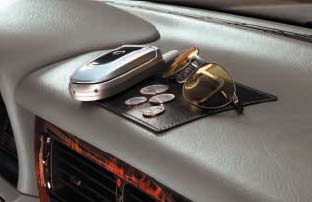
photo copyright and courtesy of Driving Comfort
The Original Sticky Pad by Driving Comfort is a “grippy” surface to hold cell phones, sunglasses, and other necessities on your dashboard.
My Own Story: The Last Time I Drove a Car
September of 1985 was the last time I drove a car. I vividly remember following my husband Dave to the Chevy dealership to have some work done on our Impala. He drove “my car,” the Ford Pinto with a stick shift that required more strength and energy to drive than the automatic.
For months leading up to that day and the days following, I was severely depressed about losing my ability to drive and the independence that driving represented. Our children were ages 11 and nine; I was 39 and knew that I would never drive again.
Today, 21 years after that emotionally painful day, I can look back without the pain and sadness. I understand why I began grieving the loss long before I gave up driving, and why I found excuses not to drive. It took months and months to come to terms with how my MS was affecting all aspects of my life, and as my MS worsened, I began to feel unsafe behind the wheel. That day in September, I knew it was time to hang up my keys.
I can honestly report that my life did not end when I gave up driving; it just changed. As time went on, I found ways to manage. Perhaps some of the lessons I’ve learned will help you to drive longer and with greater safety than I was able to — given the technology and adaptive devices that are available today.
Are You Able to Drive Safely?
This is a scary question, but one you MUST answer honestly. Do symptoms such as fatigue, tremors in your legs, hand strength or coordination, vision problems, or cognitive function affect your driving? Talk openly and honestly with your family and/or your doctor. You don’t want to put yourself, your family members, or anyone else at risk because your skills, thought processes, or reaction times are not up to par.
For me, leg tremors, strength to turn the key in the ignition, and fatigue were the symptoms that got my attention. As much as I wanted to continue driving, I was terrified of being involved in an accident because I might hurt someone else, and I certainly didn’t want the adverse effects an accident might have on my MS.
In an effort to hold onto our freedom to come and go as we please, we may initially be in denial about our driving abilities, ignoring the signs that may tell us it is time to restrict or even give up our driving privileges. For instance, many individuals with MS have visual problems, which might limit their side (or peripheral) views, while others may experience blind spots. Maybe signs and traffic signals have become difficult to distinguish, and judging distances and the rate of speed that other drivers are going has become challenging.
Other MS symptoms may include weakness, reduced coordination, and slower reaction time. Being able to quickly move your foot between the gas and brake peddles at appropriate times, as well as precise steering and signaling, are crucial when driving. Following signs and the rules of the road, making snap decisions while speeding along the roadway, interacting with other drivers, and knowing where to turn and when to stop can all be affected by reduced cognitive functioning.
If you or someone you are close to has MS and can see that the symptoms are interfering with the ability to drive safely, then you must view the situation objectively. Identify exactly what symptoms are having an effect on driving and investigate to see if any solutions are available. The first place to look would be with your medical professional, to see if any symptom-management strategies or medications may be of help.
If nothing new may be done medically, you can look to other possible solutions. Perhaps these symptoms are not as pronounced earlier in the day — in which case driving could be limited to the morning hours. Maybe fatigue is the issue and keeping the drive time down to shorter distances may resolve the danger of becoming tired and weak. If fatigue or other symptoms are a result of heat sensitivity, then staying inside during warmer times, and possibly using a cooling device, may be helpful. Adaptive devices (listed later in this article) are also available to assist with specific limitations.
When no solutions may be found and the symptoms of MS are compromising the safety of the driver and anyone else on the road, the time has come to stop driving. This freedom is not worth risking your own safety or that of others. Even if you work or have a family, options are available, and life will go on!
Wondering How You Could Survive Without Driving?
I admit that it’s difficult to get your mind around all the things we do that require driving, but I found ways to manage and it helped make me stronger. I asked people who were going to the same meeting, event, or activity to pick me up. For people who frequently drove me (or the kids), I gave them gas money. I didn’t feel as guilty asking for a ride and they appreciated my monetary “thank you.” Today, with inflated gas prices, it makes sense to carpool.
When people said, “Let me know how I can help,” I did. My friends have picked up a few things for me at the grocery store, taken my books back to the library, and dropped off prescriptions from the pharmacy, among other errands. Even a trip to the doctor’s office or hairdresser’s can be managed when arranged in advance. These small favors usually require little time and trouble for others to do — often they can tie them in with their own errands — and people feel good when they can help.
When family or friends are not available, other resources for transportation may often be found. These might include religious organizations, charitable groups, and government social services. Some resources may be listed in the phone book under “transportation,” and readers may also contact their State Office of Disabilities or their area’s Agency on Aging for additional sources of transportation. Anyone in need of further assistance may speak with an MSAA Helpline consultant at (800) 532-7667.
Using Adaptive Devices for Assistance
If you, your family, and your doctor have determined that with some modifications, it would still be safe for you to continue driving, there are a number of energy-conserving and adaptive products that could make driving a little easier for you. A few of these products are described in the following sections.*
Getting in and out of the car
The CarCaddie™ is a portable handle that offers you stability when getting in or out of a car, van, or truck. Easy to install, it straps around the top of the window frame providing a cushion grip to hold on to. Because it is adjustable and not permanently installed, it can be moved to other vehicles (although not suitable for convertibles or other vehicles without an enclosed window frame). The cost is about $20.
The Handybar™ is a forged-steel-shaft support handle with a soft, non-slip grip that helps you get in or out of the car with ease. Capable of safely supporting up to 350 lbs, the removable bar inserts into a “U-shaped” plate installed on your vehicle door frame. It can be used on both driver and passenger side doors and the price is about $35.
If you use a wheelchair or scooter and are able to transfer, Bruno Independent Living Aids Inc., offers several Turning Automotive Seats that use or match existing seating. Some seats just swivel, while other models have power controls that allow you to pivot and lower the seat to your level making transferring easier. Check with Bruno’s application experts to confirm compatibility with your vehicle (including sedans, SUVs, wagons, crossovers, minivans, pickup trucks, and full-size vans).
Bruno also offers special lifts to pick up your wheelchair and load it in and out of your vehicle. One model (The “Carony Turning Automotive Seating” system) even converts from a fully cushioned car seat into a wheelchair, making a separate lift unnecessary.
Most seats range in price from $1,000 to $7,000. Many automobile manufacturers provide a discount for these special seats when installed in new vehicles. If you use your vehicle to provide transportation to work, your local Department of Vocational Rehabilitation (or state agency that helps people with disabilities receive work-related accommodations) may pay for part or all of the cost.
Other adaptive devices to make driving easier
Adaptive Key Devices fit on your regular key and give better leverage to make turning keys easier. Hardware stores and home healthcare stores have different styles from which to choose. Be sure to try them first to see which works best for you. One device, the “Key Holder,” is a large ergonomically-designed handle which holds a key in position to offer maximum leverage. It holds up to two straight metal keys (for house or auto), which fold away into the curved handle when not in use. The price is $8.
An Automatic Car Starter/Keyless Entry System might be helpful if you have difficulty using keys. Install on any automatic transmission, fuel-injected vehicle and you can lock, unlock, or start your car from up to 2500 feet away. This is priced at $65 and up.
If the turn signal is on the wrong side for you to operate, the extension control, right-hand turn signal extension is a lightweight, crossover lever that operates your turn signals easily. This is installed using bands, not screws, so your vehicle’s interior remains in its original condition. It meets or exceeds VA (Veterans Affairs) specifications.
Do you have trouble turning your head or problems with your peripheral vision? You can install panoramic or wide-angle rear and side-view mirrors to widen your view. By using the regular and wide-angle mirrors together, you’ll have greater visibility and won’t have to turn your neck as much. Some mirrors have double sided tape on the back of them so they’re easy to install; others attach with screws. These range in cost from $20 to $30.
For added safety when backing up, you can install a Back-Up Alert warning alarm and light. Just replace one of the backup lights in your light truck, RV, car, or van with this combination beeper and tail light. Whenever your vehicle is in reverse, it will automatically emit a continuous beeping sound. Installation is as easy as changing a light bulb and the device is guaranteed for as long as you own your car. The cost ranges from $30 to $40.
Trouble managing your seatbelt? You could use a seatbelt extender, which is a piece of seatbelt material about eight inches long with a buckle on the end that clicks into the existing seat belt. Originally designed to provide extra room for larger drivers and passengers (over 215 pounds), it makes the seatbelt easier to grasp, pull, and buckle for people with arm, shoulder, or strength limitations. Unfortunately, seatbelt extenders are not a universal fit and some car models do not even offer the device. Some dealers will include the extender when you purchase a new car. If interested, you may contact your car dealership to see if there is a seatbelt extender for the car you drive.
Take Advantage of Services for Drivers with Special Needs
All states offer temporary and permanent disabled parking permits and license plates for people who are unable to walk or have difficulty walking. In most cases, the permit must be authorized by your physician. The disabled parking permit allows holders to park in designated handicapped parking spots, as well as metered street or municipal parking spots of one-half hour or more, without time restrictions (unless otherwise posted). For more information about disabled parking permits, contact your state Department of Transportation (DOT) about the requirements and application procedures where you live.
Every car needs gas. However, how do you obtain your gas if you have strength or mobility limitations? The federal Americans with Disabilities Act (ADA) requires that gas stations, including self-service, provide refueling assistance at the same price as self serve to disabled patrons. Please note that patrons must ask for the discounted price. For more information contact the United States’ Department of Justice ADA Information Line at (800) 514-0301 (voice) or (800) 514-0383 (TDD) or look for more information online at www.ada.gov/gasserve.htm.
If You Get Pulled Over While Driving
Most law enforcement officers are trained on techniques and procedures for interacting with people with disabilities. However, if your speech, coordination, or walking abilities are impaired, being stopped by a police officer could lead to miscommunication and misunderstandings. As a safety precaution, keep an informational card handy.
The Rocky Mountain MS Center offers identification cards for individuals with MS. The card includes your name, address, physician’s name and address, as well as emergency contact on the one side; common symptoms of MS (such as problems with balance, walking, speech, and vision) are listed on the other side. When submitting the application for the card, the diagnosis of MS will need to be confirmed by your physician.
The center recommends that you keep this card in a convenient place, such as in your wallet near your license. For more information, readers may visit their website at www.mscenter.org and select “Get Your MS ID Card” on the right side of the page. Individuals without access to the internet may call the center’s toll-free number at (866) 557-7030, or locally at (303) 788-4030.
If you are pulled over, safety tips to follow include:
- Pull over to the shoulder or other open area on the right
- Turn on the car’s interior light
- Place both hands on the steering wheel
- Wait until the officer arrives, then provide the informational card along with your license
- People with speech or hearing problems may want to communicate by writing. Drivers and law enforcement officers can request an interpreter, especially if communication is complicated or the charge is serious.
Law enforcement officers may initiate a medical review either from personal observation or if a number of complaints have been received from citizens.
If Concerned about a Driver’s Ability to Drive
If you’re concerned about a family member or friend who you feel should have his or her driving skills re-evaluated, contact your state Department of Motor Vehicles (DMV) or Department of Transportation (DOT) for the rules and regulations regarding drivers with a disability.
You might also want to mention your concerns to the driver’s physician. For privacy reasons, the doctor may not be able to discuss his or her examination results. The physician can, however, fax a simple letter regarding his or her concerns to your state DMV. They will act on the doctor’s recommendation and suspend the driver’s license. In most states, if doctors have reason to believe an individual’s driving is impaired, they must report it.
A private citizen or family member may also report an unsafe driver to the state DMV or DOT. They will need to obtain a medical review form from the state and have a second party witness to begin the review process. The specific details of this process may differ from state to state.
Drivers can appeal the decision. Licenses can be restricted; for example, driving may be limited to staying within five miles from home, no highway driving, or no driving at night. Please note that if the person gets better and can prove his or her ability to drive, driving privileges may be reinstated.
Drive or Ride Safely
Dr. Jack Burks, MSAA’s vice president and chief medical officer, explains, “An often-overlooked medical issue is the effect of medication on driving. Certain medications cause fatigue, inattention, drowsiness, and cognitive problems. Individuals need to ask their doctor about the effects of their treatment before getting in the driver’s seat.”
Dr. Burks continues, “Independence is an honored value. As disability occurs, some people fight as hard for the right to drive as any sixteen-year old. For teenagers, it is paramount in their minds — as witnessed by their zeal for driving. The issue is the same, control and independence.
“Alternatively, the issue is safety in both groups. Many people with MS cope more readily with a cane, scooter, or wheelchair than giving up driving. The struggle between independence versus safety (theirs and others) is not easy — and the answer is not always obvious. Soul searching, counseling, and a driving evaluation may all be needed.
“Once the decision has been made to stop or restrict driving (for example, limiting one’s driving to daylight hours within the local neighborhood), the adjustment may actually reduce anxiety and stress. Family members and friends often become more involved and relationships can grow closer. Figuring out bus schedules and handicap transportation options stimulate people’s creativity, although one must be prepared for frustration at times. With thoughtful trip planning, such efforts can also increase efficiency when several trips to the store are avoided.”
Dr. Burks concludes by noting, “As the famous ski racer, Jimmie Heuga tells the participants at the Heuga MS Wellness Center, ‘It is not the cards you’re dealt in life that matters, as much as the way you play those cards.’ Adjusting to changes in their driving status, whether limiting or discontinuing their operation of a motor vehicle, can be a blessing to some MS patients — especially if they no longer feel safe behind the wheel.”
*Please note that MSAA does not endorse or recommend any specific product or service. The products in this article are used only as examples. Interested readers will need to determine on their own the value of any product or service listed. MSAA cannot be held responsible for the use of these items and any possible issues that may result. This article is for informational use only; decisions to drive and to use specialized equipment may only be made by the individual with MS, family members, and medical professionals.
Assistive Devices to Help with Driving
For more information on the assistive devices mentioned in this article, readers may contact the businesses shown below.* In addition to the products listed, many of these companies offer other assistive products for the car and home.
Dynamic Living
428 Hayden Station Road
Windsor, Connecticut 06095-1302
Phone: (888) 940-0605
Website: www.dynamic-living.com
- The Car Caddie™
- The Handybar™
- Key Holder
Bruno Independent Living Aids, Inc.
1780 Executive Drive, PO Box 84 Oconomowoc, Wisconsin 53066
Phone: (800) 882-8183 or (262) 567-4990
Website: www.bruno.com
- Turning Automotive Seating system
- Turning seat and convertible wheelchair combination
GNU Industries, Inc.
1919 NW 19th Street Building 1A
Ft. Lauderdale, Florida 33311
Phone: (800) 780-1409
- Automatic Car Starter
- Keyless Entry System
- Back-up alert
DesignTech International, LLC.
1 Viper Way
Vista, California 92081
Phone: (800) 274-0200 for retailer
Website: www.designtech-intl.com
- Automatic Car Starter
- Keyless Entry System
- Back-up alert
Mobility Products & Design
PO Box 306, 144 South 100 West
Winamac, Indiana 46996
Phone: (800) 488-7688
Website: www.mobilityproductsdesign.com
- Hand, foot, and steering controls
- Key, turn, gear, and parking brake extensions
Driving Comfort.com
PO Box 9036
Charlottesville, Virginia 22906
Phone: (800) 675-5411
Website: www.drivingcomfort.com
- Panoramic rear view mirror
- Wide-angle side mirrors
- Back-up alert
For information on driver rehabilitation specialists, you may visit The Association for Driver Rehabilitation Specialists at www.driver-ed.org.
*Please note that MSAA does not recommend or endorse any specific product or service; readers are responsible for the evaluation and use of any items they select.
